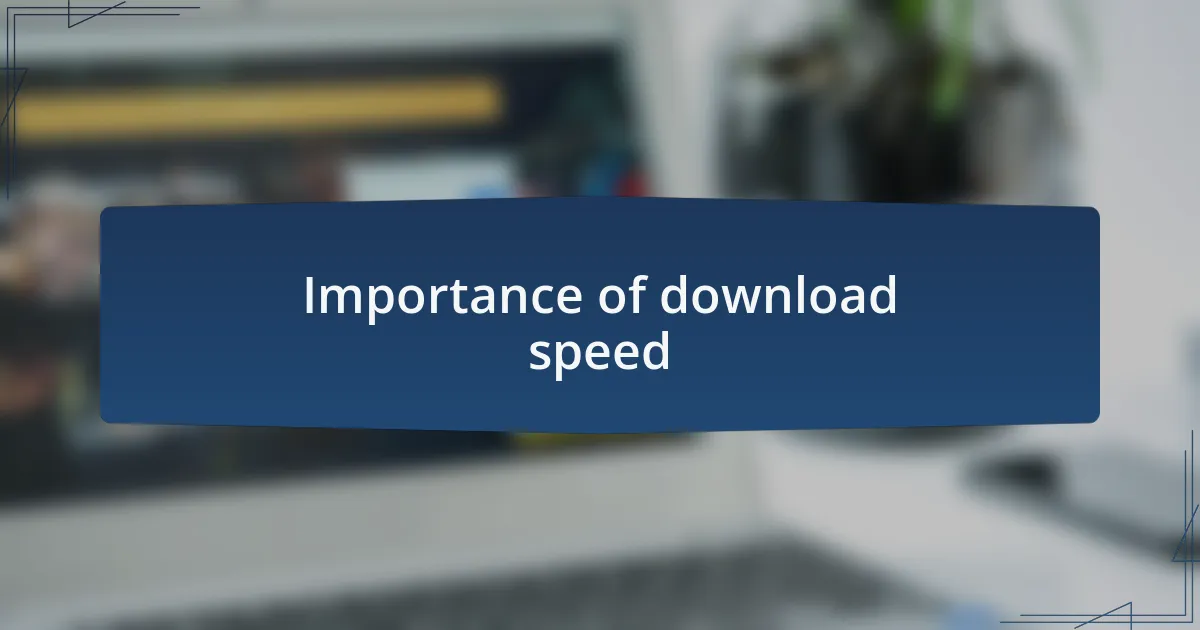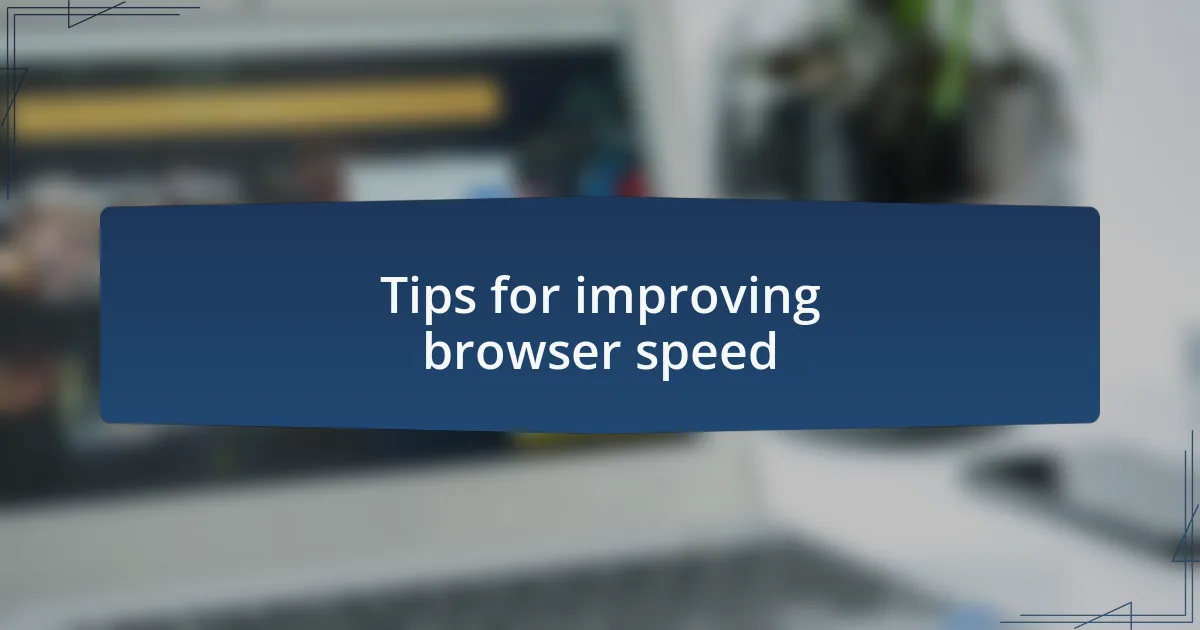Key takeaways:
- Browser speed tests can vary significantly due to factors like internet connection, hardware performance, and latency.
- Download speed is vital for productivity and user satisfaction, impacting tasks such as software updates and streaming.
- Regular maintenance, such as clearing cache and limiting extensions, can greatly improve browser performance.
- Testing browsers under different conditions reveals how network stability and settings affect overall speed and usability.

Understanding web browser speed tests
When I first delved into web browser speed tests, I was surprised by how much they can vary from one test to another. Have you ever noticed how what seems like a simple task, like loading a web page, can be affected by multiple factors? Things like internet connection, hardware performance, and even background processes can play a significant role, shifting results dramatically and making them feel somewhat unreliable at times.
One experience that stands out for me was running a speed test one afternoon while my kids streamed a movie in the next room. I was eager to see how my browser stacked up, yet the results surprised me—downloads were slower than I’d expected. It made me realize how our perceptions of speed can often be influenced by our immediate surroundings and online activities, adding a layer of complexity to understanding these speed tests.
Understanding web browser speed tests also involves recognizing the metrics at play. Speed tests typically measure different aspects, such as download speed, upload speed, and latency. I remember initially overlooking latency, thinking it wouldn’t affect my browsing experience significantly. However, after further testing, I found that even slight delays in latency could impact how quickly a page renders, reminding me how every detail matters when we gauge our browsing efficiency.

Importance of download speed
Download speed plays a crucial role in how we experience the internet. I recall a weekend where I attempted to download a large software update. The agonizingly slow speed made me wonder: why does something as essential as updating tools have to feel like waiting in line for hours? High download speeds can transform what should be a quick task into a frustration, impacting productivity and overall user satisfaction.
When I think back to those moments where a slow download left me staring at a progress bar, it’s clear that every second counts. It’s not just about impatience; it affects my ability to work effectively. A swift experience can lead to more seamless multitasking and less interruption, fostering a more enjoyable online journey. Have you ever found yourself losing focus while waiting? I have, and it’s a reminder of how download speed can influence our everyday activities.
Moreover, ensuring speedy downloads isn’t just a luxury—it’s a necessity in this digital age. Whether I’m streaming a video for work or downloading essential files for a project, I’ve learned that faster download speeds enable me to stay connected and efficient. When downloads lag, I feel a sense of disconnect, as if the flow of my daily routine is suddenly halted. Speed truly matters, fostering not just productivity but also a sense of ease in this fast-paced world.

Factors affecting browser performance
One major factor impacting browser performance is the browser’s architecture. I remember the time I switched from a lightweight browser to a more feature-rich one. Initially, I was thrilled by the abundance of extensions and add-ons, but soon, the increased resource consumption slowed everything down. I found myself wondering if all those bells and whistles were worth the trade-off in speed.
Another significant element is internet connection stability. There was a time I faced frequent disconnects while using a particular browser. If only the connection could stay strong, I thought, my experience would be so much smoother. It was frustrating to see the endless loading symbol, and it made me realize how even the best browser could falter if the underlying connection wasn’t reliable.
Lastly, cache and cookies play a pivotal role in performance. I often find myself clearing my cache after intensive browsing sessions. It’s almost like giving my browser a fresh start! When I made this a regular habit, I noticed snappier load times and a reduction in lag. Have you ever experienced that revitalizing boost after cleaning up your browser? It makes you appreciate how even small maintenance tasks can significantly enhance your browsing experience.

My experiences with speed testing
I remember my first attempt at speed testing a browser—it felt like a mini science experiment. Armed with various online tools, I eagerly compared download speeds across different browsers. The variation surprised me; one browser consistently outperformed the others, and I couldn’t help but wonder what hidden optimizations it employed to achieve such stellar results.
During the testing process, I frequently encountered unexpected variables that influenced my results. For instance, I often forgot to disable my extensions, which skewed my speed test outcomes. After realizing this mistake, I started testing browsers in their incognito modes. The improvement was noticeable, and I felt a sense of satisfaction in figuring out how to obtain more accurate data.
As I continued to delve deeper into speed testing, I began to appreciate the subtle differences that could dramatically transform my browsing experience. There were days I felt genuinely frustrated when a browser’s slower speed hindered my productivity. This taught me the value of not only picking the right browser but also understanding how my own habits impacted performance. Have you ever felt the difference just a few milliseconds can make in your daily browsing? It’s fascinating how something so seemingly small can create a ripple effect.

Lessons learned from results
The results of my speed tests were eye-opening. For instance, I discovered that even minor tweaks in settings could yield significant speed improvements. One afternoon, I decided to turn off a rarely used feature in one browser, and I was pleasantly surprised by the boost in download speeds. This experience highlighted how a bit of exploration can lead to optimizations that might not be obvious at first glance.
Another lesson learned was the impact of network conditions on speed. I once conducted tests while connected to both Wi-Fi and a wired connection, and the differences were stark. It was a reminder that external factors play a crucial role in our browsing experiences. Have you ever tested your browser under different conditions? It’s amazing how your environment can dramatically shift performance.
I also realized that not all speed is equal to performance. While one browser may excel in download speeds, it doesn’t necessarily mean it offers the best user experience. I found myself gravitating towards browsers that balanced speed with features that enhanced usability. This raised a question for me: how much are we willing to sacrifice speed for a more convenient browsing experience? Understanding this balance has been invaluable in my decision-making process.

Tips for improving browser speed
To improve browser speed, one effective tip is to regularly clear your cache and browsing data. I remember the first time I did this; my browser felt like a brand-new application. It was as though the software had been bogged down by memories of my online adventures. Have you ever experienced that sluggishness? Clearing out old files can free up space and make everything run more efficiently.
Another approach is to limit the number of active extensions and plugins. Initially, I was tempted to install every tool that promised to enhance my browsing experience. However, it didn’t take long to realize that they were doing more harm than good. Now, I selectively choose only the most essential extensions and find that my browser operates more smoothly. This makes me wonder how many of us are unintentionally slowing ourselves down with unnecessary add-ons.
Lastly, keeping your browser updated is crucial for speed and security. I’ve had instances where new features and enhancements drastically reduced loading times. Each update often comes with performance improvements that I’ve learned to appreciate over time. Have you checked if your browser is up to date lately? It’s a simple step that can lead to noticeable enhancements in your browsing speed.